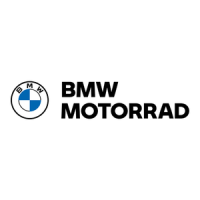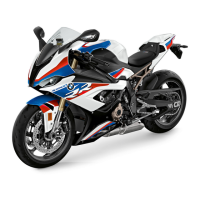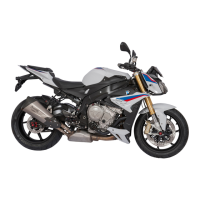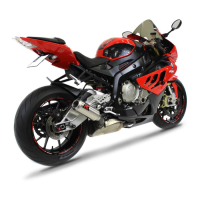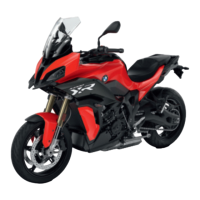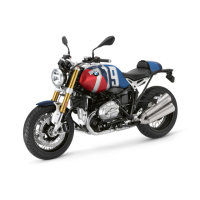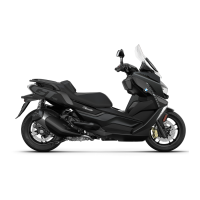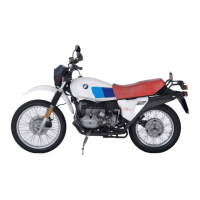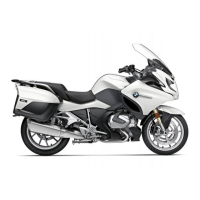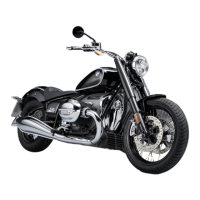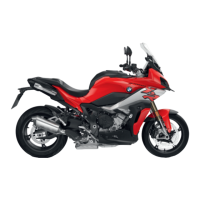
Do you have a question about the BMW Motorrad S 1000XR 2020 and is the answer not in the manual?
| Displacement | 999 cc |
|---|---|
| Max Power | 165 hp (121 kW) at 11, 000 rpm |
| Transmission | 6-speed |
| Final Drive | Chain |
| ABS | Standard |
| Traction Control | Standard |
| Front Tire | 120/70 ZR17 |
| Rear Tire | 190/55 ZR17 |
| Wheelbase | 1, 548 mm |
| Max Torque | 114 Nm (84 lb-ft) at 9, 250 rpm |
| Rear Suspension | Aluminum swing arm |
| Front Brakes | Dual 320 mm discs, 4-piston calipers |
| Seat Height | 840 mm |
| Fuel Capacity | 20 L |
| Dry Weight | 226 kg |
| Engine Type | 4-stroke, 4-cylinder in-line |
| Front Suspension | Upside-down telescopic fork, Ø 45 mm, adjustable compression and rebound stage |
| Rear Brakes | Single 265 mm disc, single-piston caliper |
Records for motorcycle model, VIN, color, registration, and license plate.
Fields for service contact, name, and retailer address/stamp.
Introduction to the manual's structure and motorcycle overview.
Explains common symbols and abbreviations used in the manual for clarity.
Description of optional equipment (OE) and accessories (OA) on the motorcycle.
Provides key specifications, dimensions, weights, and performance data for the vehicle.
Identifies major components on the left side of the motorcycle with numbered labels.
Identifies major components on the right side of the motorcycle with numbered labels.
Details the layout and functions of the motorcycle's instrument cluster and its indicators.
Explains the meaning of various indicator and warning lights on the instrument cluster.
Describes the display elements and information shown in the Pure Ride view.
Outlines the structure and functions accessible through the TFT display's View menu.
Instructions on operating and securing the ignition and steering lock using the motorcycle keys.
Details the operation of the motorcycle's ignition and starting system without a physical key.
Explains the operation of all motorcycle lighting systems, including headlights and turn signals.
Describes the selection and function of different riding modes (RAIN, ROAD, DYNAMIC, DYNAMIC PRO).
Instructions for operating the cruise control system, including setting, accelerating, and decelerating.
Explains the function and operation of the Hill Start Control system for starting on inclines.
How to operate and adjust the heated grips to different levels for rider comfort.
Guides on accessing and resetting various onboard computer functions and trip data.
Important warnings and general information about the TFT display, connectivity, and apps.
Explains the operation of the Multi-Controller and MENU rocker button for navigating the display.
Details Bluetooth technology, pairing procedures, and managing connections for audio and communication.
Information on the 'My vehicle' menu, including check control, range, tire pressure, and voltage displays.
Instructions for using the navigation system, including destination entry, route guidance, and system settings.
How to make and receive calls, manage contacts, and use phone functions via the TFT display.
Instructions for adjusting the motorcycle mirrors and their mounting arms.
Guidance on adjusting the headlight beam for different traffic conditions and road conditions.
How to adjust the windshield height for rider comfort and protection.
Procedures for adjusting the brake levers and checking their free travel.
Essential safety advice for riders, including protective gear and handling precautions.
Step-by-step guide to starting the motorcycle engine safely and efficiently.
Recommendations for the engine break-in period to ensure optimal performance and longevity.
Explains the process of shifting gears and the function of the Gear Shift Assistant Pro.
Information on achieving optimal braking distance and understanding brake system behavior.
Details on fuel grades, tank capacity, safe refueling procedures, and fuel quality.
Explains how the ABS system works, its benefits, and how it prevents wheel lock-up.
Details the function and operation of the Dynamic Traction Control system in various riding modes.
Information on the electronic chassis and suspension adjustment system and its automatic load adaptation.
Describes the selection and function of different riding modes for optimal performance and safety.
Explains the Tire Pressure Control system, including sensor function, pressure ranges, and warnings.
Procedures for checking engine oil level, capacity, and specification.
Instructions for checking brake function, pad thickness, and fluid levels.
Guidance on checking tire pressure, tread depth, and wheel rim condition.
Safety precautions and steps for jump-starting the motorcycle's battery.
Maintenance instructions for the battery, including charging, care, and connection/disconnection procedures.
Explains how to replace fuses and provides a fuse assignment chart for electrical components.
Instructions for lubricating the drive chain, checking tension, and checking for wear.
Information on using the onboard electrical sockets for accessories and automatic switch-off features.
Instructions for opening, closing, removing, and installing the motorcycle's side cases.
Details on operating the topcase, including opening, closing, and securing it.
Instructions on installing, operating, and removing the navigation system and its mount cradle.
Recommendations for using BMW Motorrad cleaning and care products for optimal maintenance.
Guidelines for washing the motorcycle, including precautions for dirt, insects, and temperature.
Instructions for cleaning specific parts like plastics, trim panels, windshields, and TFT displays.
Advice on washing the motorcycle to protect paintwork from long-term damage and aggressive substances.
Common issues with engine starting and Bluetooth connections, with their possible causes and remedies.
Details on recommended fuel, quantities, consumption, and emission standards.
Specifications for engine oil capacity, type, and topping-up procedures.
Specifications for front and rear brake systems, including pad material and disc thickness.
Information on tire combinations, wheel sizes, and their impact on control systems.
Key dimensions of the motorcycle, including length, height, width, and seat dimensions.
Data on vehicle weights, load capacities, and maximum payload.
Procedure for reporting safety defects to regulatory bodies and the manufacturer.
Information on BMW Motorrad's service network and the importance of regular maintenance.
A detailed table outlining recommended maintenance tasks based on mileage and time intervals.
Explains the purpose of service confirmations and lists standard repair procedures.
Information regarding the certificate for the electronic immobilizer system.
Certification details for the Keyless Ride ID device, including FCC and IC compliance.
